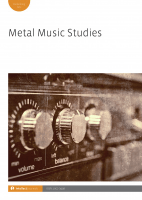
Metal Music Studies
Scope & Guideline
Exploring the Depths of Metal Culture
Introduction
Aims and Scopes
- Cultural Analysis of Metal Music:
The journal emphasizes the study of heavy metal as a cultural phenomenon, exploring its societal implications, subcultural identities, and the narratives that emerge from metal music scenes worldwide. - Interdisciplinary Methodologies:
Research published in Metal Music Studies often employs diverse methodologies, including qualitative analyses, quantitative approaches, and historical perspectives, allowing for a comprehensive understanding of metal music. - Gender and Identity Studies:
A significant focus is placed on examining gender dynamics within metal music, including issues of masculinity, femininity, and the intersectionality of identity within metal subcultures. - Global Perspectives on Metal:
The journal captures the global nature of heavy metal by publishing research that addresses metal scenes in various cultural contexts, including Latin America, the Middle East, and Asia, thereby promoting a more inclusive understanding of the genre. - Theoretical Frameworks:
Contributions often engage with theoretical frameworks from cultural studies, sociology, and musicology, providing critical insights into the aesthetic and ideological functions of metal music.
Trending and Emerging
- Intersectionality in Metal:
Recent studies are increasingly exploring the intersections of race, gender, and class within metal communities, highlighting how these factors shape experiences and identities in the genre. - Metal and Activism:
Emerging scholarship focuses on the role of metal music as a form of activism, particularly in contexts of social and political upheaval, as seen in the exploration of revolutionary music in the Muslim world. - Digital and Online Metal Communities:
The impact of digital media on metal fandom and community-building is gaining traction, with research examining how online platforms facilitate connections among metal fans and influence the genre's evolution. - Cultural Trauma and Memory:
There is a growing interest in how metal music addresses themes of trauma and cultural memory, particularly in relation to historical events and collective experiences within specific communities. - Transnational Metal Scenes:
Research is increasingly recognizing the transnational nature of metal music, investigating how local scenes influence and interact with global metal cultures, thereby enriching the discourse around metal's global reach.
Declining or Waning
- Traditional Genre Analysis:
While genre analysis remains relevant, there has been a noticeable shift away from purely categorizing metal subgenres. The focus has moved towards more nuanced discussions of blending genres and cultural contexts. - Historical Narratives of Metal's Origins:
Research centered on the historical origins of metal music appears to be declining. Scholars are increasingly prioritizing contemporary issues and the current socio-political context of metal over retrospective historical studies. - Mainstream Metal Critique:
The journal has seen a decrease in articles critiquing mainstream metal acts, suggesting a possible shift in focus towards underground and independent scenes, reflecting a broader interest in subcultural movements. - Technical Musical Analysis:
While technical analyses of musical structures and compositions have been a staple, there seems to be a waning interest in purely technical studies without socio-cultural context, favoring more holistic approaches instead. - Regional Studies of Western Metal Scenes:
There has been less emphasis on studies focused solely on Western metal scenes. As global perspectives gain traction, traditional regional analyses may be seen as less relevant in the broader discourse.
Similar Journals
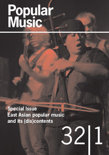
Popular Music
Illuminating the Intersection of Sound and SocietyPopular Music, published by Cambridge University Press, is a leading academic journal that has been at the forefront of contemporary music studies since its inception in 1981. With its comprehensive scope encompassing a rich diversity of topics within the fields of Cultural Studies and Music, this journal holds a respectable Q2 ranking in both categories as of 2023, underscoring its significant impact on the scholarly discourse surrounding popular music. Researchers, professionals, and students alike will find invaluable insights within its pages as it explores the socio-cultural dynamics of music from various global perspectives. While it is not an open-access journal, the publication aims to foster critical dialogue and interdisciplinary scholarship. Based in the United Kingdom, Popular Music serves as a vital resource for those interested in the intersections of music, culture, and society, sustaining a vibrant academic community through rigorous peer-reviewed articles and reviews. Engage with the latest research and deepen your understanding of popular music's ever-evolving landscape.
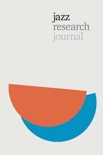
Jazz Research Journal
Innovating Perspectives on Jazz History and CultureJazz Research Journal is a premier academic publication dedicated to advancing the field of jazz studies. Published by EQUINOX PUBLISHING LTD in the United Kingdom, this journal serves as a vital platform for scholars and practitioners alike, aiming to foster dialogue and research in the rich tapestry of jazz history, theory, and practice. With an ISSN of 1753-8637 and an E-ISSN of 1753-8645, the journal has established its presence in the academic community, focusing on innovative research that showcases jazz as a dynamic and evolving art form. Although currently classified in the Q4 category of music within the Scopus rankings, the journal aspires to elevate its standing by publishing cutting-edge research that challenges conventional perspectives and contributes to a deeper understanding of jazz culture. Accessible from 2017 to 2023, the journal acts as a vital resource for researchers, professionals, and students passionate about music studies, particularly in jazz, offering a comprehensive space for groundbreaking inquiry and scholarly discourse.

LIED UND POPULARE KULTUR-SONG AND POPULAR CULTURE
Unveiling the Cultural Tapestry of MusicLIED UND POPULARE KULTUR-SONG AND POPULAR CULTURE, published by WAXMANN VERLAG GMBH, is a unique interdisciplinary journal that delves into the rich interconnections between song and popular culture, facilitating discourse among researchers, professionals, and students interested in cultural studies and musicology. With ISSN 1619-0548, this prestigious journal serves as a crucial platform for scholarly analysis, critical reviews, and innovative research exploring various facets of popular music and cultural expressions in Germany and beyond. Although classified in the 2023 Scopus category quartiles as Q4 in both Cultural Studies and Music, the journal maintains an essential role in fostering engagement and reflection on evolving cultural practices. Although it is not available as Open Access, articles from the journal have previously contributed valuable insights and shaped the conversation on popular culture from its inception in 2002 to its recent issues in 2023. Researchers will find this journal particularly relevant for its focus on underrepresented voices and themes within the cultural landscape.

Musicology Today
Advancing Music Research for a Global AudienceMusicology Today, published by SCIENDO, is a pivotal journal in the field of musicology, presenting a platform for scholars, researchers, and practitioners to disseminate their findings and engage with current trends in music research. With its ISSN 1734-1663 and E-ISSN 2353-5733, the journal aims to provide a comprehensive overview of various aspects of music, including theory, history, and ethnomusicology, fostering a multidisciplinary dialogue among its contributors. Located in Warsaw, Mazovia, Poland, this journal is not only committed to high academic standards but also to promoting open access to knowledge, thereby enhancing accessibility for a global audience. As it continues to bolster its reputation in the academic community, Musicology Today plays an essential role in shaping the future of music scholarship and invites the engagement of seasoned researchers and emerging voices alike.
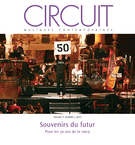
Circuit
Illuminating the Path of Circuit InnovationCircuit is a prominent academic journal published by PRESSES UNIV MONTREAL, specializing in the field of electrical engineering and circuit design. With its ISSN 1183-1693, the journal serves as a vital platform for disseminating cutting-edge research, innovative methodologies, and breakthrough technologies that shape the future of circuit theory and applications. Despite the absence of an official impact factor, the journal maintains a commitment to rigorous peer review and scholarly excellence, ensuring high-quality content for its readers. Although it operates under a traditional subscription model rather than Open Access, Circuit is essential for researchers, professionals, and students seeking to deepen their knowledge in circuit engineering and related disciplines. Its position within academic literature makes it an invaluable resource for advancing the understanding and development of electrical systems, highlighting the ongoing importance of this field in a technology-driven world.
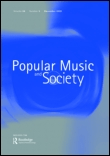
POPULAR MUSIC AND SOCIETY
Connecting Melodies to Social DynamicsPOPULAR MUSIC AND SOCIETY, published by Taylor & Francis Ltd, is a leading interdisciplinary journal that explores the intricate relationships between popular music and social dynamics. With an ISSN of 0300-7766 and E-ISSN 1740-1712, this esteemed journal has established a significant presence in the academic community since its inception, covering a broad scope from 1971 and continuing to provide critical insights into contemporary issues in popular music research. Currently classified as Q1 in both Cultural Studies and Music for 2023, it ranks impressively within the top quartile of its fields, showcasing its scholarly impact and relevance. With a Scopus ranking of #42 in Music and #305 in Cultural Studies, POPULAR MUSIC AND SOCIETY serves as an essential platform for researchers, educators, and students to engage with innovative theories and analyses that reflect the evolving cultural landscape. The journal does not currently offer Open Access options, ensuring a focused readership that values in-depth scholarly work. Nestled in the United Kingdom, this publication continues to shape discussions around music's role in society, making it a pivotal resource for those dedicated to understanding the cultural significance of popular music.
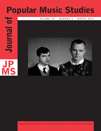
Journal of Popular Music Studies
Advancing Insights into Music's Social ImpactJournal of Popular Music Studies, published by University of California Press, is a preeminent academic journal dedicated to the exploration and analysis of popular music and its cultural implications. With an ISSN of 1524-2226 and an E-ISSN of 1533-1598, this journal encompasses a range of methodologies, encouraging interdisciplinary dialogue across fields such as musicology, cultural studies, and sociology. Since its inception in 1988, it has provided a platform for critical examination of popular music through various lenses, contributing significantly to the understanding of music in contemporary society. The journal maintains a robust reputation, currently holding a Q2 ranking in the Music category of Scopus, positioning itself within the 58th percentile among its peers. As an invaluable resource for researchers, professionals, and students alike, the Journal of Popular Music Studies remains committed to fostering innovative scholarship and discussions that illuminate the impact of popular music on social and cultural landscapes.
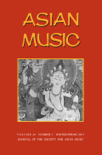
ASIAN MUSIC
Unveiling the Harmonies of Culture and Sound.ASIAN MUSIC is a distinguished academic journal published by University of Texas Press, focusing on the rich and diverse musical traditions of Asia. With an ISSN of 0044-9202 and an E-ISSN of 1553-5630, this journal serves as a key platform for interdisciplinary research that encompasses musicology, ethnomusicology, and cultural studies related to Asian music practices. While ASIAN MUSIC is not an open-access journal, it provides valuable insights and scholarly articles that contribute significantly to the understanding of music’s role within Asian cultures. The journal originally covered works from 2002 to 2010 and has a reputation for fostering discussions that celebrate the intricacies of sound, performance, and society. Targeting researchers, professionals, and students alike, ASIAN MUSIC stands as a crucial resource for those engaged in the study of music in its multifaceted context.

Muzikoloski Zbornik
Connecting Scholars Through Musical InquiryMuzikoloski Zbornik is a prominent open-access journal in the field of musicology, published by the esteemed University of Ljubljana Press since 1965. Hailing from Slovenia, this journal has been dedicated to advancing the study of musical heritage, theory, and practice, serving as a vital platform for researchers, professionals, and students alike. With a notable Q2 category ranking in the field of music and a Scopus ranking of 109 out of 180 in Arts and Humanities, Muzikoloski Zbornik showcases high-quality research, fostering discourse and collaboration among scholars globally. The journal embraces a diverse range of topics, from ethnomusicology to music education, ensuring its relevance in an ever-evolving academic landscape. By providing unrestricted access to its content, it champions the dissemination of knowledge and supports the growth of the musicology discipline.
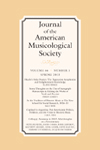
JOURNAL OF THE AMERICAN MUSICOLOGICAL SOCIETY
Elevating discourse in the field of music studies.JOURNAL OF THE AMERICAN MUSICOLOGICAL SOCIETY, published by University of California Press, is a prestigious peer-reviewed journal dedicated to advancing the field of musicology. With an ISSN of 0003-0139 and E-ISSN 1547-3848, this journal has been a cornerstone of scholarly communication since its inception in 1970 and continues to be relevant through 2024. Its esteemed standing is reflected in its Q2 ranking in the Music category and a respectable 71/180 ranking in the Arts and Humanities discipline, placing it in the 60th percentile among its peers. The journal provides an essential platform for researchers, professionals, and students to explore diverse topics in musicology, ranging from historical studies to contemporary analyses. While it does not currently offer Open Access options, its rigorous editorial standards ensure the publication of high-quality research that contributes significantly to the academic dialogue in music studies. With its address based in the United States at 155 Grand Ave, Suite 400, Oakland, CA 94612-3758, the journal remains a vital resource for those seeking to deepen their understanding of the complexities of music and its societal impacts.